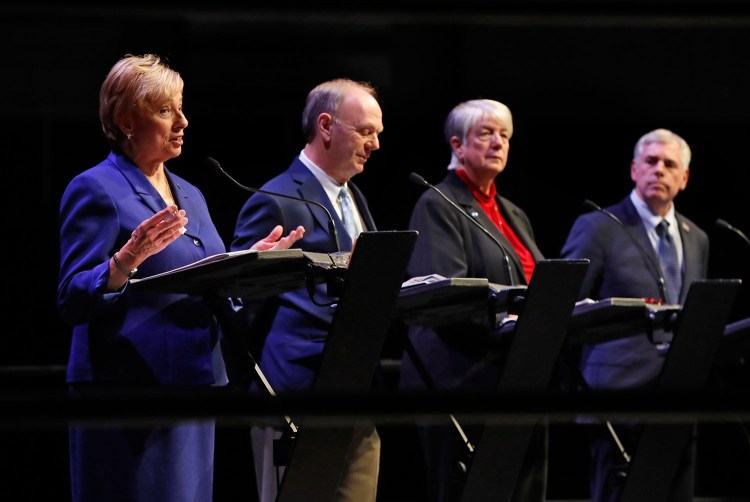AUGUSTA — The four candidates running to be Maine’s next governor squared off in a debate for the second time this week, maintaining the civil tone that has characterized the contest even as they outlined their differences on key issues at the University of Maine at Augusta on Thursday night.
Just 12 days before Election Day, Democrat Janet Mills and Republican Shawn Moody, the front-runners, differed on how they would address the drug crisis, abortion and health care. The two independents in the race, state Treasurer Terry Hayes and Alan Caron, a Freeport businessman and consultant, mostly sided with Mills, including agreeing that health care was a human right.
When asked what she would do as governor to help Mainers suffering from substance use disorders, and not just opioid addiction, Mills, Maine’s attorney general, pointed to her effort to provide the overdose antidote naloxone, known by its trade name Narcan, to 85 different police departments.
She said 552 lives had been saved with those doses of Narcan and that just this week a 26-year-old woman who is four months pregnant was saved. Mills said her plan to help tackle the crisis is extensive but it would include a “hub and spoke” treatment system as well as increased efforts at prevention and education, as well as law enforcement.
Moody said he would focus on resourcing “law enforcement” adequately to go after drug-trafficking gangs, but also that he supported “sober houses” and “peer-to-peer” counseling programs.
“No one can help somebody to a pathway to recovery like somebody that’s been there,” Moody said. But he also said he would work to rebuild the state’s mental health care system.
Hayes said she believes one of the biggest challenges in the drug addiction crisis is the stigma that comes to those suffering from the disorder. She said breaking down the “shame that comes with this brain disease” would be key.
“People who find themselves addicted have great difficulty reaching out for help because there is shame and judgment and I think we need to change that,” Hayes said.
Caron said the overdose crisis is a symptom of a much deeper problem, the loss of hope in Maine people who lack opportunities. “Nothing has frustrated me more than watching government in gridlock over this issue while people were dying,” Caron said. “We should have found a deal a long time ago.”
ON ABORTION RIGHTS
The candidates also made clear-cut distinctions in their positions on abortion rights. While Moody repeated he would oppose the use of taxpayer funds for abortion, Mills made it clear she believes a woman has a legal right to an abortion.
“Safe and legal abortion is a medical procedure to be chosen by a woman with consultation from her doctor,” Mills said.
“It’s very interesting that conservatives are always arguing that we have to get government off their backs, out of their lives and there ought to be freedom and liberty,” Caron said. “Unless we are talking about a woman’s choice.”
Hayes said if the question were about men’s health care rights, it probably wouldn’t be asked.
“These are decisions that are tough, made by individuals, and I support women and their right to make that decision,” Hayes said.
EVOLVING STANCES
Asked to name one thing they’ve changed their mind on, Moody said he changed his mind on medical marijuana. Moody said he was opposed to it until his grandmother, “Nana Moody” needed it while battling breast cancer and that he voted to legalize medical marijuana in 2010.
Mills said she changed her mind on gay marriage and fully supported gay couples’ rights to marry when she previously had supported creating a law that would have allowed for domestic partnerships.
Hayes said she changed her mind on allowing unions to automatically collect dues from workers even if they didn’t want to join the union and reversed her vote on the issue while serving in the Legislature.
Caron quipped he didn’t have any regrets about marijuana. “Because I grew up in the ’60s,” he said, drawing laughter from the audience.
But he said he had changed his view on taxing rich Mainers at much higher rates.
“I still believe that at the national level,” Caron said. “But I figured out when you do that, one state at a time, a whole bunch of people move and they go to another state.”
Scott Thistle can be contacted at 791-6330 or at:
sthistle@pressherald.com
Twitter: thisdog
Copy the Story LinkSend questions/comments to the editors.




Success. Please wait for the page to reload. If the page does not reload within 5 seconds, please refresh the page.
Enter your email and password to access comments.
Hi, to comment on stories you must . This profile is in addition to your subscription and website login.
Already have a commenting profile? .
Invalid username/password.
Please check your email to confirm and complete your registration.
Only subscribers are eligible to post comments. Please subscribe or login first for digital access. Here’s why.
Use the form below to reset your password. When you've submitted your account email, we will send an email with a reset code.